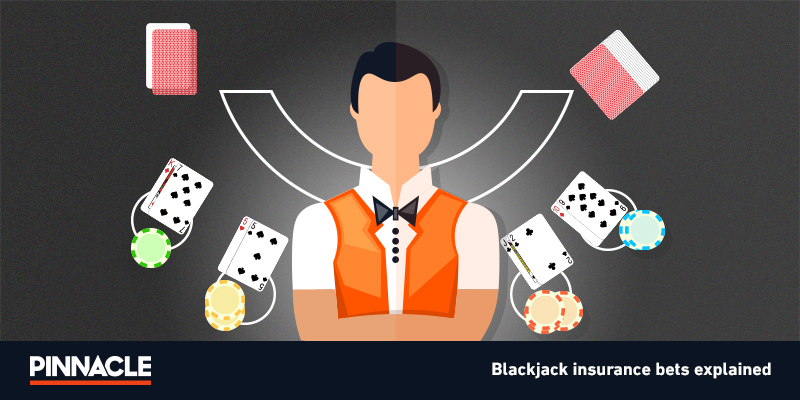Should You Ever Get Insurance In Blackjack
Posted : admin On 4/3/2022- Should You Ever Get Insurance In Blackjack For Real
- Should You Ever Get Insurance In Blackjack Without
- Should You Ever Get Insurance In Blackjack Real Money
- Should You Ever Get Insurance In Blackjack Winnings
If you bet $100, your insurance bet must always be $50. If the dealer does have a blackjack, you get paid off at 2:1 for your insurance bet, which means it pays off at $100. You don’t need to have a blackjack to place an insurance bet. You can take insurance with any total versus the dealer’s face-up card. That's the kind of thinking you have to get out of your head. Now read this next statement three times. You will always win or lose the bet on your hand just the same, whether you take Insurance or not! This is absolutely true. If you've bet $1000 on your hand and have 20, but the dealer has a 10 in the hole for blackjack, you're going to lose. The player has a blackjack and the dealer does not; The dealer has a blackjack and the player does not Why Players Should Not Get Insurance. Insurance bets are placed on a smaller table. Many players, however, think about breaking even and could make more by having insurance. What lures many players into getting an insurance bet is its payout. The insurance bet in blackjack was introduced to give the perception to players that they’re going to protect their hand against the dealer’s. Blackjack and insurance has specific rules and I’m gon na go over them so that you understand what insurance is all about. What you’re playing blackjack and the dealer has an ace as an up card. There is only one scenario when a blackjack player should even consider taking insurance. If you also hold a blackjack, you might want to insure your own blackjack to guarantee a positive return. Blackjacks are paid at 3-2 and they don’t come around that often.
Anyone who’s read a reasonably good post about basic strategy in blackjack knows that you should never take insurance. It’s a sucker bet.

But sometimes casino dealers will confuse players by offering them “even money.” That’s just another way of offering insurance to the player.

The selling point of even money in blackjack is that you’re going to win no matter what. This post explains the fallacy behind thinking that insurance (or even money) is a good idea when playing blackjack.
How Even Money Works in Blackjack
Even money works when you’ve been dealt a natural, a two-card hand that totals 21. Such a hand is also called a blackjack, and it pays off at 3:2 in most games.
There’s one catch to having a natural. If the dealer also has a blackjack, it’s a push. When the dealer has an ace showing as the face-up card, you get the opportunity to place an insurance bet. They’ll often refer to this as taking “even money.”

If you have $100 in action and agree to take even money, the dealer will pay you $100 and take your cards before looking at her hand to see if she has a blackjack, too.
This seems like a good idea. After all, if you turn down the even money, and the dealer flips over a blackjack, you lose your $100.
On the other hand, if you decline even money, you win $150 on your $100 bet. Which is the better deal?
It’s about how much you win or lose in the long run.
To really understand whether even money makes sense, you need to look at how often the dealer will win or lose and how much you’ll win on average every time.
Decisions and Consequences in This Blackjack Situation
Let’s simplify this for a minute. You have two choices. You can take even money and win $100. Or you can decline even money, winning either $150 or facing a push.

It should be obvious why declining even money makes sense, because when you push, you don’t lose any money. You just get your original bet returned to you.
How often will the dealer have a blackjack?
This varies based slightly on how many decks are in use, but for the sake of simplicity, let’s assume that the dealer will have a blackjack only 30% of the time (this is really close to the actual number). 70% of the time, you’ll win 3:2 on your bet.
Let’s play this situation out 100 times in a row.
- Player A takes even money, which means he wins $100 on all 100 hands, or $10,000.
- Player B declines even money, which means he wins $150 on 70 hands, or $10,500.
Obviously, declining even money results in more wins in the long run.
What’s the Difference Between Even Money and Insurance?
Insurance is a side bet that the dealer has a 10 as the hole card. You can only place this bet when the dealer has an ace showing face-up, and the wager for this must always be half of the original wager size. If you bet $100, your insurance bet must always be $50.
If the dealer does have a blackjack, you get paid off at 2:1 for your insurance bet, which means it pays off at $100.
You don’t need to have a blackjack to place an insurance bet. You can take insurance with any total versus the dealer’s face-up card. If you have any total other than 21, you lose your original bet against the dealer.
But since insurance pays off at 2:1, you’ll wind up breaking even on that action.
So basically, even money is just an insurance bet that you can only make when you have a blackjack. When you take even money, though, you lose your opportunity to get the 3:2 payoff.
Should You Ever Get Insurance In Blackjack For Real
You don’t have to put up the additional bet, because the casino has just subtracted that $50 from your payoff for your hand.
Should You Ever Get Insurance In Blackjack Without
Insurance is available any time the dealer has an ace showing, but even money is only available when the dealer has an ace showing and you have a blackjack.
Should You Ever Get Insurance In Blackjack Real Money
There’s An Exception to Every Rule
Should You Ever Get Insurance In Blackjack Winnings
Not every blackjack game in every casino offers 3:2 payouts for a blackjack. In some games in some casinos, the payout for a blackjack is only 6:5.
You should NEVER play in such a game, because it gives the house an edge almost 1.4% higher than it would have if it paid the standard amount.
But if you ignore that advice and choose to play in such a game, the even money bet suddenly makes sense.
Here’s why. You still have the 30% probability that the casino will have a blackjack. So, now, you’re looking at winning $120 approximately 70 times out of 100, or $8400.
But if you take even money, you’ll win $100 every time for $10,000 in winnings. In a 6:5 blackjack game, even money is a GREAT bet.
The problem is that it doesn’t come up often enough to make up for what it does to the house edge. A good blackjack game might have a house edge of around 0.4% if you play with perfect basic strategy.
Convert that to 1.8%, which is what the 6:5 payout does and, suddenly, that great game becomes pretty mediocre. And that 1.8% accounts for the even money proposition, too.
Conclusion
The basic blackjack strategy should inform your every decision in blackjack, but the correct basic strategy varies based on the rules in place.
The differences between insurance and even money and when it’s appropriate to place such a bet are great examples of this.
Do you ever take even money when it’s available at the casino? If so, do you think this post might have changed your mind about that?
Let me know what you think in the comments.